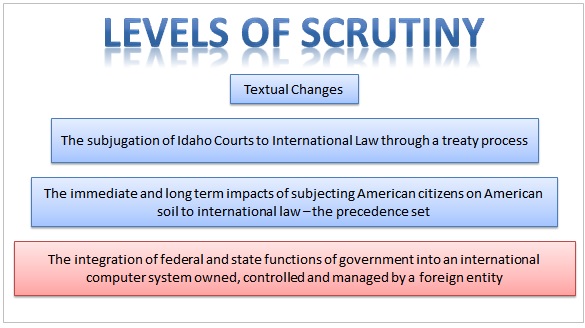On June 29th, 2017, newspapers in Idaho reported that Senator Jim Risch nominated a member of the Idaho State Legislature to be the U.S. Attorney for Idaho. The good news was that U.S. Attorney Wendy Olson was being replaced. The bad news was that the nominated replacement was Idaho State Senator Bart Davis.
If Risch had nominated almost any other attorney in the State of Idaho, I wouldn’t be writing this article but Bart Davis was in the Senate on the Judiciary Committee and he was a member of the Uniform Law Commission (ULC) during the fight in 2015 to prevent a reference to a Hague Convention from being put into Idaho law. The original bill number was S.1067. The Senate Judiciary Committee passed it out of committee with a Do Pass recommendation. The House Judiciary Committee did not. That battle occurred at the end of legislative session. Because of that, Governor Butch Otter called a special session of the legislature specifically to ramrod S.1067 renamed HB 1 through the legislature.
The Uniform Law Commission (ULC) is located in Chicago. As their name implies, they produce uniform law for the states to provide a common process or procedure across state boundaries. The issue in the case of S.1067 was pertaining to family law – specifically child support enforcement but it was across international borders by treaty.
An edict came down from the Department of Health and Human Services (HHS) instructing state administrators of the Child Support Plans under Title IV-D of the Social Security Act and Other Interested Individuals that the Uniform Law Commission’s Uniform Interstate Family Support Act of 2008 (UIFSA 2008) must be passed into state law or the state would lose access to the federal systems of child support enforcement and they would lose funding for the program – including possibly TANF funds.
UIFSA 2008 contained the following language:
Senate Bill 1067 submitted by the Judiciary and Rules Committee
AN ACT RELATING TO THE UNIFORM INTERSTATE FAMILY SUPPORT ACT; AMENDING … AMENDING CHAPTER 10, TITLE 7, IDAHO CODE, BY THE ADDITION OF A NEW SECTION 7-1004A, IDAHO CODE, TO PROVIDE FOR THE APPLICATION OF THE CHAPTER TO RESIDENT OF FOREIGN COUNTRY AND FOREIGN SUPPORT PROCEEDINGS;
In the text of legislation:
(2) “Child-support order” means a support order for a child, including a child who has attained the age of majority under the law of the issuing state or foreign country.
(3) “Convention” means the Convention on the International Recovery of Child Support and Other Forms of Family Maintenance, concluded at The Hague on November 23, 2007.
Succinctly, UIFSA contained the language to force the states to subjugate their state courts to the decisions of foreign courts through an international treaty for reciprocal treatment of – not just child support enforcement – but also “other forms of maintenance”. Those other forms of maintenance include:
lien, levy, execution, and filing claims in probate or bankruptcy actions (ref. National Conference of Commissioners on Uniform State Laws, Annual Conference July 18 – 25, 2008. Page 27 Adobe, paragraph 2)
The inclusion of filing claims in probate brings to mind the question, can our soldiers who were fighting in what even members of our own Congress consider to be an illegal war, be sued personally for the support of families in the Middle East who lost the bread winner in the war? It’s not clear that possibility was even considered.
The treaty, The Hague Convention on the International Recovery of Child Support and Other Forms of Family Maintenance considers that the justice systems of all member countries are equals under international law when we all know that they are not despite the assurances that all member countries must meet international standards of jurisprudence – and what does that mean exactly? That the judge wears a black robe? That’s a standard in the U.S. but it means absolutely nothing in terms of delivering justice.
The issues with including reference to this Convention in Idaho law are complex despite the trivialization of it by the majority of the Idaho legislature. Most of them saw it merely as a money issue… if they didn’t pass it into law, they would lose federal funding which amounted to somewhere between $16 and $60 million dollars. Bart Davis saw the legislation as simply textual changes. I would challenge anybody to find a piece of legislation modifying existing law that doesn’t involve textual changes. One would hope that wasn’t the level of scrutiny Bart Davis gave to S.1067 but all we have to go on is what he said publicly in the Senate Judiciary Committee hearings.
The Idaho Senate maintains audio files of the committee hearings. The following are the two senate hearings on S.1067. Senator Bart Davis speaks in both videos about the legislation and the issues with S.1067 from his point of view as a representative of the citizens of Idaho – and keeping in mind that he was a member of the Uniform Law Commission at the time.
Idaho Senate Judiciary and Rules Committee, 2015 Legislative Session
Committee hearing on S.1067, held February 25, 2015 [status hold for more investigation]
Committee hearing on S.1067, held on March 9, 2015 [status – committee voted to move it with a recommendation: do pass]
Bart Davis and his considered opinion that S.1067 was about textual changes calls into question not only his judgement, but also the level of scrutiny given to federal mandates that come through the administrative system. Idaho Health & Welfare, the agency that brought the UIFSA 2008 legislation to the legislature did have an attorney assigned to the agency but that attorney specializes in administrative law. The issue with S.1067 was international law and the obligations it imposes on the State of Idaho and the citizens of Idaho. It ties the hands of the Idaho state courts except if they want to create an international incident. What are the odds of that?
The Idaho Attorney General, Lawrence Wasden was nowhere to be seen during the debate on S.1067 meaning that he failed to represent the State and the people of Idaho in what was clearly an unconstitutional mandate by the federal government to pass UIFSA 2008 into Idaho law (See Extortion through Cooperative Federalism).

The last one on the list above received less scrutiny than any other issue concerning UIFSA 2008.
• The integration of federal and state functions of government into an international computer system owned, controlled and managed by a foreign entity
Underneath the surface issues of international and domestic law is the fact that embedded into the treaty obligations is an integrated, international computer system that was commissioned by the European Commission, paid for by the European Union and will be managed and run at The Hague. The system is called iSupport and it is a case management system. With the European Union and The Hague Conference having control of the bridge for the international child support enforcement system (iSupport), the extortion power of access and control of the funds that the federal government used against the states, moves to Europe.

Functional Requirements WG (2) 28 April 2015
Annex 1 – Deliverables Document – Call for Tender version 02 draft – Page 82
The Hague Convention of 23 November 2007 on the International Recovery of Child Support and Other Forms of Family Maintenance establishes the rules – data, access and process for use of the system. Succinctly stated, this treaty creates an administrative dependency between the Europeans, the federal government and the states.
Given that the hands of our state courts were tied concerning foreign court orders in state law by participation in an international treaty in violation of Article 1, Section 10 of the U.S. Constitution;
Given that an administrative dependency with no power to effect the operation of the computer system;
Given that unconstitutional federal extortion was used to force the states pass the UIFSA 2008;
Given that the Convention was discussed as if it was only child support enforcement cases when the treaty language actually includes lien, levy, execution, and filing claims in probate or bankruptcy actions;
Given that there was no effort to defend the State of Idaho, its citizens and the sovereignty of our courts,
As a member of the Idaho Legislature, as a member of the Uniform Law Commission, as a citizen of Idaho, as a licensed attorney, Bart Davis failed on all accounts to represent the citizens, the State of Idaho and the nation as it pertains to the serious and significant issues involved with the Uniform Interstate Family Support Act of 2008 and The Hague Convention on the International Recovery of Child Support and Other Forms of Family Maintenance.
For Davis, money was the main consideration that bought the affirmative vote on S.1067 / HB.1. We don’t need any more employees of government that simply acquiesce to extortion and bribe money. We need strong leaders that operate from a moral foundation with an eye towards the future for our children and grandchildren. Transferring American sovereignty to a foreign international administrative system without objection does not demonstrate the qualities that are absolutely necessary in this time of attack on American sovereignty.
It’s a vote of no confidence for Bart Davis for U.S. Attorney.
The full archive of TVOI News articles on S.1067 and HB.1 can be found HERE












